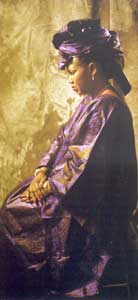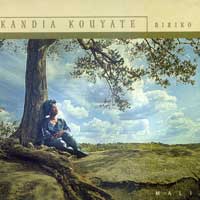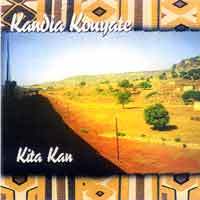|
Kandia Kouyaté |
|
|||||
|
Dès son
jeune age, elle est déjà une légende vivante. Très différente et bien plus riche dans la texture que les voix nasales de la plupart des chanteuses griots. Son vrai fort est la chanson de louange, un classique du Mandé. Au Mali, les chanteuses n'ont pas le droit d'interpréter ces chansons. Mais Kandia, considérée comme une maître chanteuse ou "n'gara" (un titre convoité que peu de chanteurs maliens arrivent à obtenir) est une exception. La belle voix de Kandia fait la paire avec un don pour les paroles poétiques et une présence dynamique sur la scène. Dans ses concerts à Bamako au Mali, on voit souvent les membres de l'audience cloués sur place quand elle plonge dans une de ses improvisations, ou dans un tourbillon autour d'une seule note tenue. Ils disent que son chant leur donne le vertige, comme si ils étaient saouls de sa voix. Cela lui a value le surnom de "la dangereuse". L'aspect
le plus frappant et original de sa musique quand elle a percé au début
des années 80 était ses arrangements.
|
||||||
|
||||||
|
This, her first ever solo CD, reveals the full force of her magnificent, powerful contralto voice, which ranges from the deep classical style of ancient Mali, unusually accompanied on a string orchestra, to the luscious rolling melodies of her native Kita (a historic town in the hills of western Mali) accompanied on guitars, kora and ngoni (lute). And for her young fans, there are modern dance tracks with plenty of rhythm and groove. She also excels at the beautiful love songs for which Kita is famous. No Malian singer, male or female, can equal her lyricism and expressiveness in these songs. A jelimuso (female griot), her voice is comparable in its fullness and intensity to that of the great gospel singers like Mahalia Jackson - and is unique in Mali, very different and much richer in texture than the nasal voices of most female griots. Her real forte is the more classical, historical praise song of the Mande. In Mali,
women singers are usually denied the right to perform these pieces.
But Kandia, considered a mastersinger or
"ngara" - a coveted title which few Malian singers manage to obtain
- is the exception. The most
striking and original aspect of her music when she first shot to fame
in the early 80s was her arrangements. Before superstars Salif
Keita or Mory
Kante had released their groundbreaking albums "Soro" and
"Akwaba Beach", it was Kandia who first
began using the type of ethereal female chorus that has since become
the trademark of Mande music. This was considered quite Co-producer
Ousmane Kouyaté makes an invaluable contribution
with his own inimitable arrangements, not to mention some wonderfully
mellow, bluesy guitar. |
||||||
| P
03/03/2004 |
||||||
 Kita
Kan est une expression Malinké qui veut dire la Voix de Kita. En réalité,
Kandia Kouyaté est beaucoup plus que ça,
c'est l'une des plus grandes chanteuses du Mali, révéré dans toute l'Afrique
de l'ouest.
Kita
Kan est une expression Malinké qui veut dire la Voix de Kita. En réalité,
Kandia Kouyaté est beaucoup plus que ça,
c'est l'une des plus grandes chanteuses du Mali, révéré dans toute l'Afrique
de l'ouest.
 "Kita
Kan" est un résultat étonnant. Ousmane Kouyaté
l'arrangeur a apporté une contribution considérable avec ses propres
arrangements inimitables, sans oublier de mentionner sa douce guitare
"blues".
"Kita
Kan" est un résultat étonnant. Ousmane Kouyaté
l'arrangeur a apporté une contribution considérable avec ses propres
arrangements inimitables, sans oublier de mentionner sa douce guitare
"blues". 
